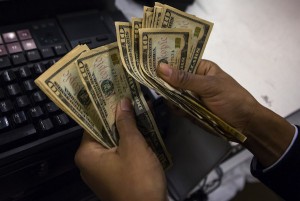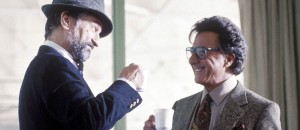
Thoughts on Campaign Finance: Does The Dog Wag His Own Tail?
October 9th, 2015
Back in 1997, a darkly humorous film was released entitled “Wag The Dog,” The stars were Dustin Hoffman, who played a Hollywood producer. Hoffman goes to work for a Washington spin doctor (Robert DiNiro) ahead of presidential elections. The movie, although fiction, had a ring of reality; the Lewinsky scandal broke just a few weeks later.
The film was about the politics of distraction – in this case, an artificially created war. What does this have to do with the vexed issue of campaign finance, you may ask? Well, campaign finance reform seeks to address not only who holds the purse strings behind the scenes, but who controls the message – and who makes money out of it, including perhaps the media that transmits that message. For example, if a company that wants to sell genetically modified seeds gives a large donation to a political party, that party may well feel obliged – compelled, even – to trumpet during its election campaign that GM food is the answer to all Jamaica’s food security woes. If elected, that party may through its Agriculture Minister continue to tout and even implement GM food programs – whether it is in the Jamaican people’s best interests, or not.
Nowadays, public relations (PR) is an integral part of politics. With the advent of social media and blogs such as this one, in a democratic society where freedom of speech and expression are still valued and practiced and in most cases permitted, public relations is key. As the current election campaign heats up, Members of Parliament are tweeting memes and flyers illustrating the work they have done in their constituencies. They hire people to create hashtags and schedule tweets and Facebook posts and Instagram images. They create short videos, take out ads. All these things cost money. They have to get their campaign messages out, and they must be professionally packaged. So obviously, the more sophisticated their slogans and quotes and hashtags are, the more money they cost. PR and publicity takes up a big chunk of every political candidate’s budget, because without it, where would they be?
Politicians nowadays need to reach different audiences. It is not simply about printing Tshirts and baseball caps with one’s face on it for one’s supporters. It’s a more complex business, winning hearts and minds, and more expensive. So who pays for it all, and does the funder have his/her own agenda?
Well, it’s three and a half years since the Electoral Commission of Jamaica’s (ECJ) report on campaign finance was approved “with concerns” by the Jamaican Parliament. Since then, despite promises that campaign finance reform was just around the corner, legislation is languishing in Parliament, and will obviously not be passed before the next election. The Representation of the People (Amendment) Act, 2014, which provides for the registration, regulation and funding of political parties, was passed by the House of Representatives on October 14. At the time, Opposition Leader Andrew Holness commented: “The political party must be transparent, the political party must meet international standards of accountability and transparency and, therefore, we will comply, we will register. But I could not, with good conscience at this time, seek to benefit from or take public funds.”
So, the political parties remain somewhat “iffy” about campaign finance legislation. If the political will was there, it would have been passed already, wouldn’t it?
Why on earth should the average Jamaican be in the least concerned with campaign finance, though? We have enough to worry about (just putting food on the table, for example) don’t we? There are several possible scenarios with consequences that many of us may not have thought about. For example, a political candidate with a large wad of money (from an unknown source) has a huge advantage over one who has less money; he can buy influence, splash his largesse around – and yes, spend more on fancy advertising campaigns. This, of course, has been a concern in many countries, especially in the United States. We decry the situation there (their campaigns are all about money, we say) but this could easily happen in Jamaica too.

The Jamaican operator of the Olint investment group David Smith is in the Turks and Caicos, fighting extradition on money laundering charges to the United States. He is cited as having funded both Jamaican political parties. (Photo: Gleaner)
Then there is the other serious concern of “dirty money” or illegally obtained money funding political campaigns. We have already seen this happen: David Smith of Olint (currently fighting extradition from the Turks and Caicos to the United States) gave money to both political parties in 2007 (US$5 million to the Jamaica Labour Party and US$2 million to the People’s National Party) according to the Supreme Court of Turks and Caicos’ Confiscation Order of 2012.
Until the campaign finance legislation is passed, political candidates in Jamaica may continue to receive cash in brown paper bags anonymously, with no idea where it came from. There is often no transparency or accountability for these funds.
This is the danger: unseen hands may be pulling the strings. Unknown and sinister forces may take control, and start wagging the dog. This is not a far-fetched scenario; it has happened in many parts of the world, and continues to happen. Just do some “googling.”
Why does the dog wag its tail?
Because the dog is smarter than the tail.
If the tail were smarter, it would wag the dog.
We need to make sure that the dog is smart – and continues to wag its own tail.
I am a member of National Integrity Action (NIA), registered as a non-profit company in March, 2011. NIA’s mission is: “To combat corruption and build integrity in Jamaica through the persistent promotion of transparency, accountability in the conduct of government, businesses and the wider society.” NIA continues to press for the passage of campaign finance legislation.
Tags: Andrew Holness, campaign finance, David Smith, election campaign, Electoral Commission of Jamaica, House of Representatives, media, Member of Parliament, money laundering, National Integrity Action, Olint, politics, public relations, social media, Wag the Dog
The Gleaner reserves the right not to publish comments that may be deemed libelous, derogatory or indecent.
To respond to The Gleaner please use the feedback form.
- We Are the Zoomers
- Living Online with Humans and Birds: NAOC 2020
- Human Trafficking and the Problem of Public Education
- Down Memory Lane
- Are We Ready to Recover from COVID-19?
- Road Safety Matters: Is Your Vehicle Safe?
- Sexual Harassment, Me Too, and the Minister’s Disturbing Giggle
- The Vulnerable Senior Citizens, Private Care Homes and COVID-19
- A Muddle Over Masks
- Here is Something Life-Saving You Can Do: Give Blood!




